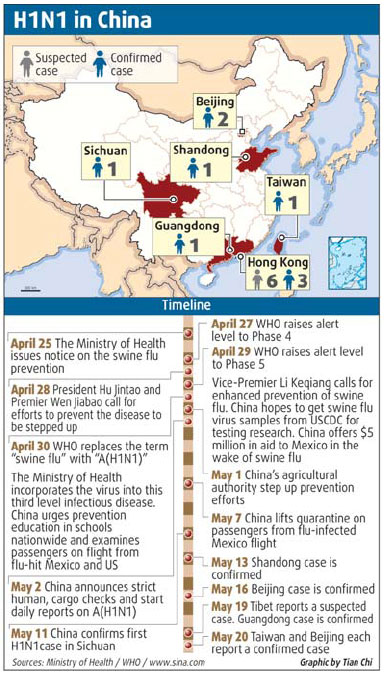
|
CHINA> Focus
 |
|
The warm hearts behind cold masks
By He Na, Wang Zhuoqiong, Xin Dingding and Ju Chuanjiang (China Daily)
Updated: 2009-05-21 10:11 One of those relieved to be out of hospital will be the Italian tourist who was suspected of being the first H1N1 virus case in the Tibet autonomous region. The 42-year-old woman, who has not been named, and her traveling companions all tested negative for the deadly strain and released from quarantine at about 10:40 am yesterday, said Dekyi, vice-chairwoman of the regional government. An examination by the China Center for Disease Control and Prevention (CDC) showed she was infected with only the A(H3N2) virus, also known as "seasonal flu", while her temperature was 37.5 C and her sore throat alleviated. She had a fever of 38.5 C, a sore throat, stuffy nose and was sweating when she arrived at Zham, a border town in the Xigaze prefecture, on Saturday and was sent straight to the hospital. The 23 other tourists in her party were put under observation at the Caiyuan Hotel, in Zham, while the Ministry of Health dispatched six experts to Tibet to back up medical staff from the Tibet health bureau. Jessical Ricci, a tourist from the United States who was in the Italian's party, told Xinhua News Agency after being discharged she was very happy she could now continue her tour of Tibet, starting with a trip to the famous Tashilhunpo Monastery. She said the group had clubbed together to buy a DVD player for a waiter at the hotel to thank him for his service, while staff presented them with hada, traditional white, silk scarves. The H1N1 flu strain has spread fast in Japan, with 232 cases already confirmed, while Chinese travel agents were yesterday canceling tours to their Asian neighbors.
 "Quite a number of tourists asked to cancel their trips to Japan," Zhang Rui, marketing manager for Beijing CAISSA International Travel, told China Daily yesterday. "They would be required by their employers to take isolation at home for at least a week if they made the visit this month." However, experts have predicted the H1N1 flu's effect will be "periodical", with Dai Bin, deputy director of the China Tourism Academy, explaining at a press conference yesterday that the damage to China's inbound and outbound tourism would last only one or two quarters. Meanwhile, the situation in neighboring countries has caused concern among Chinese overseas students, not least in Japan. On Tuesday, China's consulate in Osaka reminded students to take precautions against the virus, and, in an open letter, Han Qide, president of the Western Returned Scholars Association said the measures required their active participation and cooperation, urging them to avoid public places and report flu-like symptoms as quickly as possible. The first three of the five confirmed cases of the H1N1 virus on the Chinese mainland were all students returning for summer vacations. It has led to calls in China for those in flu-affected countries to delay or even abandon plans to come home. The debate has raged since the second case involving a 19-year-old man surnamed Lu was confirmed. Netizens have dubbed him "Lu Chuanchuan" (chuan translates as transmission) after the Information Times alleged he suspected he had contracted flu from a Mexican classmate confirmed with H1N1 virus before boarding a flight to return to China from Canada. In an interview with Xinhua on Monday, Lu said he was sorry for those people quarantined after he received criticism for visiting public places before reporting his symptoms or close contact with the Mexican student. "I wanted to go sightseeing and shopping in Beijing, but at that time I really didn't know I was infected with the virus," he said. In all, 38 people were isolated until Monday after sharing a train carriage on the D41 train from Beijing to Jinan with Lu on May 11. In his defense, however, Chen Shijun, director of Jinan's Infectious Disease Hospital, said: "The boy is innocent. Our common enemy is the virus."
|